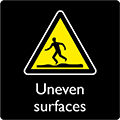Free Entry
Open any reasonable time during daylight hours with a closing time of 8pm or dusk if earlier
Address:
Church Lane, North Elmham, Dereham, Norfolk, NR20 5JU
A place with an unusual story, told by graphic panels. The small Norman chapel here stood on the site of an earlier timber church, probably the Saxon cathedral of East Anglia. In the 14th century it was converted into a fortified manor house by Henry Despenser, the unpopular Bishop of Norwich who brutally suppressed the Peasants' Revolt of 1381.
Read more about North Elmham Chapel's history.
Managed by North Elmham Parish Council.
Before You Go



Parking: There is no designated car park but there is some limited parking at the start of Church Lane near the chapel gate.
Guidebook: Prior to your visit to the chapel, you may like to buy a guidebook for it from the village church, the Church of St Mary the Virgin, just to the south of the chapel and accessed from Holt Road.
Access: The main path into and through the site is surfaced with gravel but is suitable for buggies and wheelchairs. Further access is over grass, some of it sloped.
Opening times: Open any reasonable time during daylight hours with a closing time of 8pm or dusk if earlier.
Facilities: There are no facilties at the chapel but it is in the village of North Elmham where there are a couple of pubs and shops, and a café.
Dogs: Dogs on leads are welcome.
Drone flying: Please see our Drone guidance
Plan a Great Day Out
If you would like to explore more Norman places in North Norfolk, why not visit the delightful village of Castle Acre, 13 miles to the west of the chapel. It is a one of the finest surving examples of a Norman planned settlement in the country and has an extraordinary wealth of history to delve into. The village is dominated by the monumental ruins of two of the three sites in our care there - the atmospheric Cluniac Priory and the impressive motte-and-bailey Castle and its extensive earthworks. The third site is the Bailey Gate - the surviving north gate of medieval fortifications, under which the road through the village passes.
Your Places Appeal
Did you know over 300 of our historic sites are free to explore and enjoy, but keeping them open and cared for costs more than £4.2 million every year?
With your help, we can protect these historic places and make sure they can be enjoyed for generations to come.
Whether your donation today helps pay for the work of an expert stonemason, a key keeper’s time to unlock the gates or the restoration of a rare artefact, you’ll help care for precious heritage.
Donate today